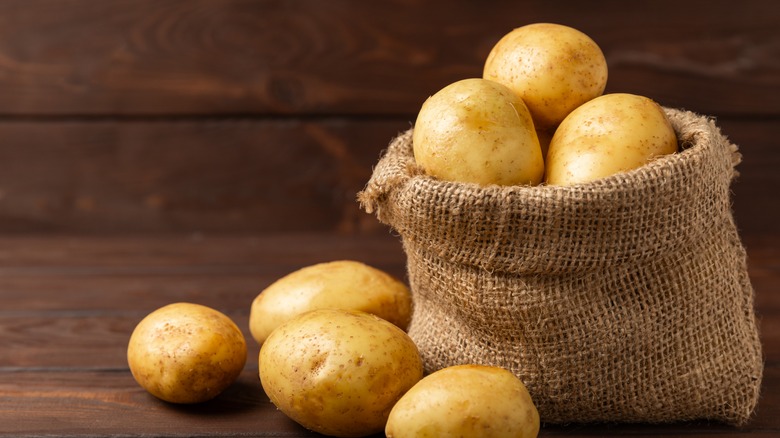The Simple Reason Potatoes Are Actually Considered Vegetables
Potatoes are one of America's favorite vegetables, and it's easy to see why — they're versatile, packed with nutrients like fiber, potassium, and vitamin C, and show up in everything from mashed potatoes to fries. In fact, the average American eats about 124 pounds of potatoes annually, making them the most consumed vegetable in the U.S. according to the USDA.
But, are they a veggie or a carb? It's an ongoing debate, but potatoes are technically vegetables because of one simple reason: They are the edible part of a plant's roots. However, they are often consumed in a meal in place of grains like bread or pasta, calling into question whether they should be considered produce at all. Potatoes also don't always have the best reputation as a healthy ingredient, largely because of unhealthy ways to cook them — like french fries, which are high in saturated fats and sodium. However, potatoes are very nutritious on their own.
Last year, the debate heated up again as the U.S. Dietary Guidelines Advisory Committee discussed the 2025 American dietary guidelines, floating the hypothetical scenario of reclassifying potatoes as grains. Soon after, 14 senators signed a letter in opposition, especially harping on the nutritional benefits of potatoes and their relatively low cost, which has implications for many students and low-income families.
Reclassifying potatoes could have unexpected consequences
In particular, the debate over the classification of potatoes as vegetables has significant implications for government-sponsored nutrition programs such as school meals and the Women, Infants & Children Supplemental Nutrition (WIC) program. The WIC program provides supplemental financial support for low-income families who otherwise wouldn't have access to nutritious meals. There are state-specific lists of produce that can be purchased under this program, and many have specific regulations for potatoes. For example, Florida allows buying potatoes fresh, frozen, or canned but the product cannot have added sugars.
Public school lunches have precise nutritional requirements too, so moving potatoes from the vegetables to the grains category could impact the schools' food budget. Many districts with limited budgets rely on the low cost of potatoes to effectively cover the needs of their students. According to research from Tufts University, American children get their most nutritious meals at school. This is especially important for lower-income students who have higher chances of experiencing food insecurity and, therefore, less access to nutrient-rich meals at home.
A spokesperson for the USDA confirmed to Scripps News that the committee isn't considering changing the classification of potatoes, which means they remain vegetables for official purposes.


